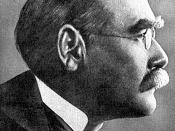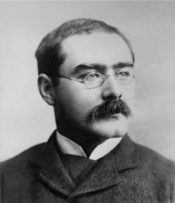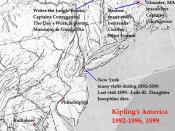Imperialism: Attitudes & Assumptions Many countries have attempted to justify their actions of occupying and colonizing other nations. Many colonizers portray the native's of these colonies as savages, juveniles, and needing welfare. At the same time these colonists consider themselves saviors, philanthropists, and hard working individuals. Many writers of the 19th century and today have there own very strong opinions. Some of the writers include Rudyard Kipling and John Ruskin, who both shared their opinions that colonizers are higher and better than their countries they are supposed to be helping. Other writers of this era will also be included to explore the tensions of viewpoints of the times.
Rudyard Kipling's White Man's Burden was written in 1899 to give advice of how the United States should interact with the colonized Philippines. Kipling explains to the United States that they are the savior of these savage people who do not know any better.
Kipling describes them as "half devil half child" (Kipling 445) in an attempt to portray these people as juvenile delinquents with no direction. Kipling also wants the United States to see that the Phillepenos are like children who need strict rules and guidelines to follow. Kipling also attempt's to make the United States aware that they must change these unbelievers into believers. Kipling warns that this will be unwelcome, however it is necessary in order to save these savages. Kipling reminds the United States to ignore this opposition because the United States is doing the right thing. Kipling also warns that during this transition the Americans must keep in the back of their mind that they will be judged and remembered by how they act. Kipling tells the United States that they must know that there will not be an easy reward and that the United States must keep working.
John Ruskin's Conclusion to Inaugural Lecture follows the ideas of Kipling's White Man's Burden. Ruskin follows Kipling's idea of one nation being better than another nation, and that these savages of the world require a western savior. Ruskin shows his feelings immediately by making clear that there are noble people who are the only people who can create noble things. Ruskin points out the British need for compliance to laws, which is even more important due to the problems in its own classes. Ruskin explains that not everyone can "be occupied in the fine arts"(Ruskin 17), and that those who do not belong in high arts must not waste their time in pleasure, but rather find their "useful energy"(Ruskin 17). Ruskin continues on to say that this "useful energy" is the tool to create the perfect culture. Ruskin's belief that the English are better stems from a few different beliefs of his. Ruskin believes that since the English are more advanced than the nations it colonized they are a superior people. Ruskin believes that their religion is better and that they must attempt to fulfill this religion. Ruskin believes that England has more noble blood and a stronger more honorable history. However, Ruskin describes the lands the English colonize as "fruitful lands of waste ground she can set her foot on". Ruskin seems to imply that England must convert all the world to their ideals, and that their ideals are the best. Ruskin says that England must continue to colonize more land and require the fidelity of its colonies to England. Ruskin goes so far as to say that their navies are "motionless churches, ruled by pilots on the Galilean lake of all the world", which seems to be a way of making his fellow Englishman feel like missionaries instead of invaders. Ruskin wants these "motionless churches" to make England the best it can be again. "Transformed from savageness to manhood, and redeemed from despair"(Ruskin 19) continues Ruskin's ideal of what England must do. Ruskin concludes his lecture by pointing out one more time that England is better and that it is the solution to savage countries problems.
Many writers have had opposing views to the ideas put forth by Ruskin and Kipling. One response that is aimed directly at Kipling's White Man's Burden is the 1899 parody Brown Man's Burden by Henry Labouchere. Labouchere begins immediately by saying that the English are only there out of greed and that the English just want get rid of these devil children. Labouchere goes on to explain that England is not being philanthropic but rather an oppressor, which opposes Said's feelings on such colonized places like Egypt.. Said felt that certain countries need like Egypt needed to be "dominated by a race that knows what is good for them better than they could possibly know" (Said 35). Said seems to think that he can tell certain countries that they do indeed require some form of domination or help. Labouchere then explains that the English encourage freedom as a reward and that they are helping you. However, when it comes down to the facts that the English colonists will not hesitate to physically crush any opposition to them. David Spurr opposes this by saying "the ultimate aim of colonial discourse is not to establish a radical opposition between colonizer and colonized." He says this because he wants to stress the importance of acceptance of the colonists, which will come easier if they are treated more fairly. Labouchere continues to contradict Kipling by saying that the colonists do not feel wrong about what they are doing because they have taken livelihoods of people's before. Labouchere points out that the English motive is money and land not helping people as Kipling claims. Labouchere points out that the English are liars that believe in God and freedom, but do not deliver anything that they claim to others only take what they want for themselves.
Another important depiction of the 19th century was La Montee de l'agonie by D. Maillet. This cartoon is a depiction of an Andean silletro carrying a European up a mountainside. Maillet's cartoon opposes Kipling's poem The White Man's Burden, and picks up where Labouchere left off. This cartoon continues the point that the English are not worried about freedom but rather themselves. The cartoon depicts the silletro with long baggy clothing which actually seems to compare to Kipling's comment that baggy clothes is associated with being a savage. Another point that could be gathered from this is the fact that the English say they are promoting freedom, however everything the English does is another way to put down a nation of people. On the other hand Said puts the idea of England thinking they are better by saying it is what England must do to help because they are better and stronger. Said supports this by saying "it was the vindication of Western imperialism".
Another interesting example of the English psyche is the Pear's Soap advertisement. In the advertisement soap represents a civilized nation, in this case England. In the bottom right there is the depiction of the great colonizer showing a savage the idea of soap. This depiction shows how the English feel they have a great new invention to introduce to an uneducated and unwise savage that almost appears to look like some kind of monkey. The boats around the top signify the English conquest and power to reach these countries and enlighten these people, as well as there ability to broaden they already vast reach.
Many people have made many judgments about countries invading and colonizing other countries. There have been people in America who to this day think that the white man's history in America is cruel and unfair. They said we were selfish and did not belong to be in this land that we now call the United States. People also felt that the white man did not belong in India, or other parts of Asia and Africa. It is sometimes the idea that the white man was way out of line to think that can impede on another countries lifestyle. However, it is also an important point to think about the grand picture. This is a world of advancement and exploration. Some societies strive on the advancement of land, trade, and money. England is included in the list of countries of self advancement. England should not be blamed for their colonization of other countries. History has shown that countries will always attempt to expand and make themselves more powerful. Perhaps some countries in history have been more tactful and fair with their colonization of countries, but in the end all of these countries have the same thing in common which is self advancement.
Works Cited Said, Edward. Orientalism. New York: Vintage Books, 1977.
Spurr, David. The Rhetoric of Empire. Durham & London: Duke University Press, 1991.
Kipling, Rudyard. White Man's Burden: 1899 Ruskin John. Conclusion to Inaugural Lecture. 1870 Maillet, D. La montee de l'agonie. 1879 Labouchere, Henry. The Brown Man's Burden. 1899





